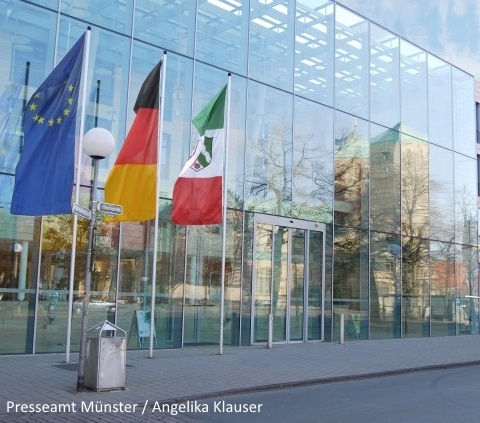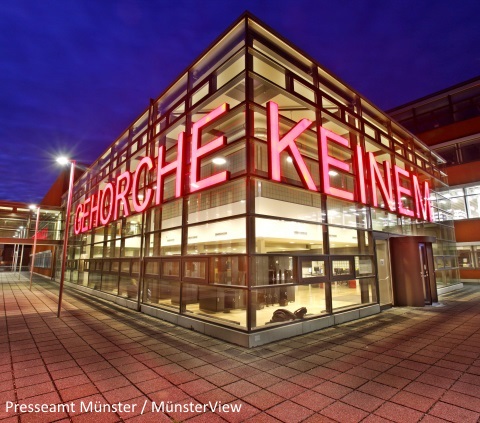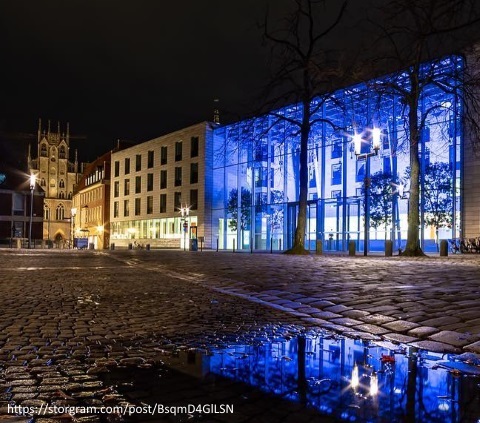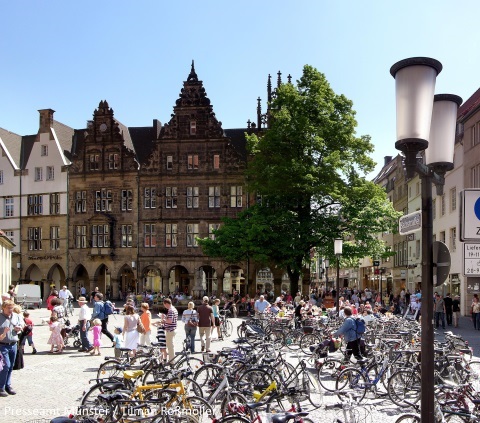euroCRIS strategic membership meeting
Exploring technical challenges to achieve a more effective system interoperability in research information management
November 18-20, 2019 at University of Münster, Germany
The euroCRIS membership meeting takes place November 18-20, 2019, in Münster, Germany. Münster is a multi-faceted city of science and learning, the City of Westphalian Peace, the capital city of bicycles and Germany’s Climate Protection Capital. Westphalia’s longstanding regional capital is a young city, thanks in no small part to its more than 60,000 students and more that 312.000 inhabitants. It is an outstanding place to live and work, rich in urban culture, municipal diversity and first-class rural recreation. It was - at least that's what we think - perfect for such a European meeting!
Founded in 1780, the → WWU (Westfälische Wilhelms-Universität) Münster is a university with tradition. It boasts 250 courses of study, 15 departments, 45,500 students, 5,500 graduates every year, a staff of 7,100 including 571 professors, and 500 internatinal partnership agreements with universities and other academic institutions all over the world. But at our university it is not numbers but people - their knowledge, their research, their curiosity - that count.
For your stay in Münster have a look at list of hotels on the right and book via each hotel's own reservation system. For more accomodations please also visit the → website of Münsters tourist information or other known booking platforms.
The membership meeting mainly will take place in the buildung of the "Bezirksregierung Münster". It is located in the heart of Münster directly next to the cathedral at → Domplatz 1-3, 48143 Münster. An overview of all locations you will find in the → venue map.
You will get there by → bus (line 1, 2, 4, 9, 10, 11, 12, 13, 14, 22). The stop is Domplatz. There is also a small → parking area. Follow the signate for "Domplatz". However, the easiest way to get there is by bike.










This is the version of the program that might be final. Minor changes may occure during the meeting - but we do not hope so. To have it in your pocket you can → download the full program. An overview of the different locations you will find in the → venue map.
This time slot is for the meeting of the euroCRIS board.
DSpace-CRIS is the first free open-source extension of DSpace for the Research Data and Information Management ever developed. Differently from other (commercial/proprietary) CRIS/RIMS, DSpace-CRIS has the institutional repository as its core component, providing high visibility on the web to all the collected information and objects. DSpace-CRIS broadens DSpace functionality and expands its data model while remaining aligned with its code base.
DSpace-CRIS adopts/is compliant with international standards and practices to facilitate interoperability and data transfer:
Following the first edition of this developers' workshop at the Spring 2019 meeting in Helsinki, this event (still TBC) will revisit the process for making CRIS systems OpenAIRE-compliant via the implementation of the → OpenAIRE CERIF-XML Guidelines for CRIS Managers. The activity is aimed at CRIS managers and developers.
What you always wished to know about → CERIF but were afraid to ask.
A discussion on the gradual expansion of the → euroCRIS Directory of Current Research Information Systems (DRIS) and its associated workflows for information collection from institutions.
An opportunity for catching up with other colleagues while enjoying a drink and a bite, for grabbing your name tag or just to check the event venue in Münster.
All sessions on this day will take place at → Bezirksregierung, Domplatz 1-3, hall 1 (ground floor).
Hello and welcome to the membership meeting and to Münster. Grab a coffee, your name tag and have a good start of the meeting main track.
Short introduction to the topics and agenda of the membership meeting as well as some organisational aspects.
Two keynotes about the current status and developments in management and usage of research information in Germany.
Inka Spang-Grau - Wissenschaftsrat Head Office → Abstract
Sophie Biesenbender - German Centre for Higher Education Research and Science Studies (DZHW) → Abstract
Time for recreation. Grab a coffee, have some interesting talks, enjoy the city.
Three talks on current developments in the domain of research information management and usage in Germany.
Malte Kramer - University of Münster / CRIS.NRW → Abstract
Julia Almering - University of Kassel / HeFIS → Abstract
Rajski, Beate; Goldschmidt, Oliver; Weidt, Gunnar - Hamburg University of Technology → Abstract
Time for recreation. Grab some food, have some interesting talks, enjoy the city.
Time for four talks about the role, current development and usage of persistent identifiers in research information management.
Friedrich Summann - Bielefeld University Library / ORCID-DE initiative → Abstract
Josh Brown - Crossref → Abstract
Stephanie Hagemann-Wilholt - TIB - German National Library of Science and Technology → Abstract
Martin Fenner - DataCite → Abstract
Time for a little bit recreation, a coffee, and some interesting conversation.
Time for three talks about how to design and use classifications in research information management.
Stephan Gauch, Humboldt-Universität zu Berlin → Abstract
Jürgen Güdler, DFG → Abstract
Sven Blanck, Leipzig University → Abstract
Is it possible to harmonise the use of research classifications?
Time for a little bit recreation, a breath of fresh air and some water.
Get an update about current and planned activities of euroCRIS from the euroCRIS board.
Get an update on current and planned products and activities by the euroCRIS Sponsors. These may include 4Science, AT-CRIS, Clarivate Analytics, Elsevier, HIS eG, Sages and Sigma.
Enjoy the joint dinner at the Ratskeller Münster and get to chat to fellow attendees on all things research information management and beyond.
All sessions on this day will take place at → Bezirksregierung, Domplatz 1-3, hall 1 (ground floor).
Good morning and welcome back to the membership meeting. Take a coffee and start your day relaxed.
Time for 10 mins lightning talks about national, European and international activities and trends in the area of CRIS, research information, research reporting / intelligence and further related topics.
Jürgen Güdler, DFG → Abstract
Sadia Vancauwenbergh, U Hasselt → Abstract
Joonas Nikkanen, CSC → Abstract
Anna Guillaumet, SIGMA AIE → Abstract
Susanna Mornati, 4Science → Abstract
Christoph Thiedig, Stefan Schelske, DZHW → Abstract
Andreas Esch, ELFI → Abstract
Time for having a look at the posters, lively discussions, and a coffee.
Andrea Wuchner, Dirk Eisengräber-Pabst, Michael Erndt, Fraunhofer-Informationszentrum Raum und Bau, Germany → Abstract
Marcus Walther, Bastian Melsheimer, Friedrich-Alexander-Universität Erlangen-Nürnberg, Germany → Abstract
Francisco J. Vizcaíno, Reyes Hernández-Mora, Isabel Martínez, Universidad de Murcia, Spain → Abstract
Florian K. Gantner, Steffen Illig, Philipp H. Rumpg, University of Bamberg, Germany → Abstract
Oliver Goldschmidt, Beate Rajski, TU Hamburg, Germany → Abstract
Peter Wittenburg, Max Planck Computing & Data Facility → Abstract
Time for 20 mins talks from euroCRIS members on national, European and international initiatives around CRIS systems, research information and further related topics.
Sergey Parinov, Russian Presidential Academy of National Economy and Public Administration (RANEPA) → Abstract
Christian Hauschke, TIB Hannover → Abstract
Nick Veenstra, Technical University Eindhoven → Abstract
Tommi Suominen, CSC → Abstract
Time for lunch. Grab some food, have some interesting talks, a look for the posters or a short excursion to Münsters weekly market.
Get an update by the strategic partners of euroCRIS about joined actvities.
Michele Mennielli, LYRASIS → Abstract
Annette Dortmund, OCLC → Abstract
Hilda Muchando, Jisc → Abstract
Three talks about recently lanched projects to expand CRIS infrastructure in Europe and beyond.
Ognjen Orel, University of Zagreb Computing Centre → Abstract
Reyes Hernández Mora Martínez, Universidad de Murcia → Abstract
Kannan P, Central University of Punjab, and K. Siva Shankar, INFLIBNET Centre Gandhinagar → Abstract
Time for recreation, having a coffee and a last look for the posters.
Two talks on discipline-oriented or subject-based CRIS systems. How do these systems get their data? How do they address interoperability issues with regard to other (e.g. institutional) CRISs or repositories?
Brian Lowe, Ontocale → Abstract
Kristel Palts, The German Aerospace Center (DLR) → Abstract
Let's sum up the meeting and say good bye. Have a safe way back home and see you.
You want to contribute to the membership meeting? You have a question about the meeting? Please feel free to get in touch with us.
eurocris.mm@uni-muenster.de